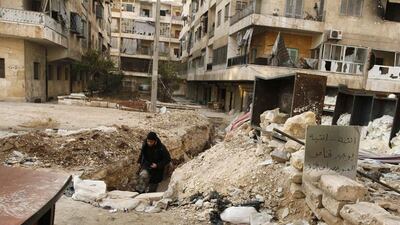DUBAI // Peace talks between the Syrian regime and opposition next month could open a political path for the “silent majority” of Syrians who support neither side, a former regime spokesman says.
Jihad Makdissi disappeared from Damascus with his family in mysterious circumstances a year ago, sparking rumours he had defected.
He has since stayed largely out of the public eye and, despite a brief statement saying he had resigned because “violence and polarisation” had “left no place for moderation and diplomacy”, he did not join the opposition, he said.
But peace talks scheduled for January 22 in Montreux and Geneva have raised Mr Makdissi’s hopes and those of other Syrians that a “third-way” solution can be found to the brutal conflict that has killed at least 120,000 people.
“After Geneva these people will dare to speak more. I am talking about the silent majority of Syrians,” he told The National in Dubai, where he is now based.
“We know it will not be perfect. It will not bring a perfect result. Any truce or ceasefire is a gain because it will give room for politics. It’s a window of opportunity.”
He said the regime had failed to address “the core issue of the Syrian people and change”, while the opposition had been “talking to the West, not the Syrian people”.
“The opposition was impatient to topple the regime. The street wants change. There’s a huge difference,” Mr Makdissi said. “If you’re in a boxing match, the opposition wants a knockout. The people want to win by points, I believe.”
Those remarks were echoed by self-described members of the silent majority in Damascus, who neither support a regime they see as repressive, corrupt and brutal, nor an opposition that has been disorganised, racked by infighting and corruption and increasingly dominated by Islamist hardliners.
“Both the rebels and the regime wrongly believe they can finish the other side militarily” said Ahmed Rahman, 43, a telecoms worker living in the Syrian capital.
“But most Syrians do not believe that is possible and maybe those fighting are coming to learn that too.
“I have real hope in the peace conference and think it will bring big change to the situation in Syria — not because I trust the regime or the rebels but I think the United States and Russia might have decided to put serious pressures on their allies.
Russia has been a key backer and arms supplier to the president, Bashar Al Assad, while the US has given limited support to moderate rebel forces trying to unseat him.
Although backing opposite sides in the war, Washington and Moscow have been instrumental in pushing for the negotiations.
Western states, alarmed by the rise of Islamist extremists in Syria, have told opposition groups that talks may not lead to the removal of Mr Al Assad and that his regime will play a key role in any transition of power, Reuters reports.
Mr Makdissi said the silent majority “believe in having a process and not an armed confrontation”.
The armed confrontation today had became like a chess game, he added. “All the players die for the sake of the king. I don’t want all Syrian people to die for the sake of the king,” he said, referring to both Mr Al Assad and opposition leaders.
In the months after the start of the uprising in March 2011, several moderate opposition figures, and people with close associations to the regime, tried to establish “third way” political movements to appeal to the silent majority.
But they failed, with the regime intent on breaking the challenge to its power by brute force.
Mr Makdissi said almost three years of bloodshed might have changed some of those calculations, giving the regime no choice but to talk with the opposition.
It will be the first time formal negotiations will have taken place since Hafez Al Assad, Bashar’s father, seized power in 1970.
In a suburb to the north of Damascus an Alawite supporter of Mr Al Assad backed that analysis.
Leyla, a 28-year-old government employee and the daughter of a retired regime military officer, said the time had come for politics.
“I think the pro and anti-Assad groups are changing their minds and moving closer together now because they discovered that the military operations have no victor and in the end are killing all of us,” she said.
“I have big hopes that the peace conference will give an exit door for both sides, the government and opposition, to put down their weapons and talk face to face for the first time.”
Mr Makdissi, former foreign ministry spokesman and a member of Syria’s Christian minority, said changing a regime that held power for more than 40 years had to be a slow process based on national consensus.
“We don’t want to replace a dictatorship with a religious tyranny. That’s what’s on the table,” he said, referring to the growing role of Islamist hardline groups in rebel ranks.
Suggestions that third-way politics would succeed now, when they failed in the summer of 2011, were dismissed as absurd by Mohammad, 32, a resident of Qaboun, a neighbourhood of Damascus that was once the scene of peaceful protests but now smashed to rubble by the war.
“Regime supporters want Bashar to stand for re-election,” he said. “After what has happened to the country, there is no way that is acceptable.
“Most Syrians want a political solution but I don’t see how it is possible in the near future. The peace talks will fail.”
* Phil Sands contributed reporting from Istanbul.
jvela@thenational.ae
psands@thenational.ae

